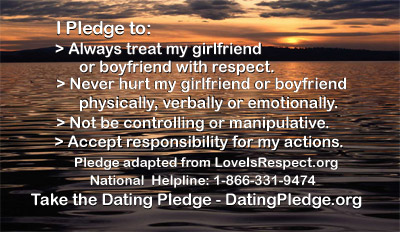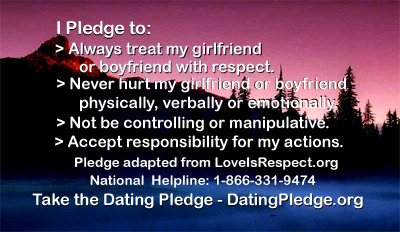 Our
beautiful 19-year old daughter, Emily Rachel Silverstein, was murdered
by her ex-boyfriend on April 9, 2009 at Gettysburg College. It's not
anything that she or we could ever have imagined would happen. Fortunately
murders are not very common, but dating violence and abuse is. 1
in 3 teens report that they have experienced physical, verbal, emotional
or sexual abuse. YOU can help raise awareness about this serious
issue, helping young people learn the warning signs of date
abuse, AND even more importantly, know what to do to protect
themselves if they are in an abusive relationship.
Our
beautiful 19-year old daughter, Emily Rachel Silverstein, was murdered
by her ex-boyfriend on April 9, 2009 at Gettysburg College. It's not
anything that she or we could ever have imagined would happen. Fortunately
murders are not very common, but dating violence and abuse is. 1
in 3 teens report that they have experienced physical, verbal, emotional
or sexual abuse. YOU can help raise awareness about this serious
issue, helping young people learn the warning signs of date
abuse, AND even more importantly, know what to do to protect
themselves if they are in an abusive relationship.
We started
the nonprofit 501 (c)(3) organization The Emily Silverstein Fund Inc.
(dba The EMILY Fund) to continue Emily's legacy of service to community
and to help raise awareness about the serious issue of dating violence.
Please
help spread the word to stop dating violence. Get Free
Dating Pledge Cards to hand out. So far we've mailed out over
600,000 cards requested by more than 1200
domestic violence agencies and schools in all 50 states! The response
has been amazing. The cards are a simple, non-confrontational way
to begin a conversation about healthy relationships and dating abuse.
Dating
violence is one of 4 crimes included in the Violence Against Women Act
adopted by the US Congress. The other 3 crimes are domestic violence, sexual assault
and stalking. Violence against women is a serious problem in America. 3
women are murdered by an intimate partner every day in America and each year 4.8
million American women are physically assaulted!
To help
states, municipalities, agencies and individuals further the goals
of the Violence Against Women Act, the US Department of Justice's
Office of Violence Against Women has worked with Congress, the President,
and nonprofits nationwide to establish months designated to raise
awareness about the four crimes included in the bill: January
is Stalking Awareness Month; February
is Dating Violence Awareness & Prevention Month;
April is Sexual Assault Awareness
Month; and October
is Domestic Violence Awareness Month.
These
months provide the perfect opportunity to help educate your community
and help stop violence against women. Get
Involved. Speak Out. Help stop violence against women.
In
2010, US Governors and Mayors declared over 900 proclamations to help
end violence against women, providing opportunities for awareness-raising
activities all across the nation.
Thank
you for helping me to honor our daughter, Emily.
Robert
Alan Silverstein (Bob)
Executive Director
The EMILY Fund
PO Box 430
Roosevelt, NJ 08555-0430
Email me: Bob@emilyfund.org
Fax: 1-888-247-1291
Dating
Pledge Cards
Over
400,000 FREE
Dating Pledge Cards distributed in all 50
states!
Please
help distribute these FREE Cards "You
have simplified the way to talk about what is really important -
RESPECT in
relationships.....thank you."
-- Dee Erlandson, Family
Crisis Center, Stevens Point, Wisconsin
"This is such a great resource!
Thanks for making it available!"
-- Jennifer Boblitt-Johnson,
Women's Crisis Center, Hebron, Kentucky more
feedback Please
consider a tax-deductible donation to help me honor my daughter Emily
even $5 allows
me to reach over 200 young people
T |
|
For
more about Emily Rachel's life and legacy: www.EmilyFund.org
WHAT
TO DO ABOUT AN ABUSIVE RELATIONSHIP
The
US Dept of Health and Human Services recommends that "if you or someone you
know has been the victim of dating violence, seek help from other family members
and friends or community organizations. Reach out for support or counseling. Talk
with a health care provider, especially if you have been physically hurt. Learn
how to minimize your risk of becoming a victim of dating violence before you find
yourself in an uncomfortable or threatening situation. And, learn about how to
get help for sexual assault and abuse. Another important part of getting help
is knowing if you are in an abusive relationship." These are some of the
warning signs:
SIGNS
OF AN ABUSIVE RELATIONSHIP
-
monitors what you're doing all the time
-
criticizes you for little things
-
constantly accuses you of being unfaithful
-
prevents or discourages you from seeing friends or family, or going to work or
school
-
gets angry when drinking alcohol or using drugs
-
controls how you spend your money
-
controls your use of needed medicines
-
humiliates you in front of others
-
destroys your property or things that you care about
-
threatens to hurt you, the children, or pets, or does hurt you (by hitting, beating,
pushing, shoving, punching, slapping, kicking, or biting)
-
uses or threatens to use a weapon against you
-
forces you to have sex against your will
-
blames you for his or her violent outbursts
(from
the US Dept of Health & Human Services, Office on Women's Health)
STAY
SAFE
(From
TheSafeSpace.org) Domestic
and dating violence is a very serious and very scary issue. Whether you are in
an abusive relationship, just got out of one or are worried about a friend or
family member, learning how to stay safe is the most important thing you can do
to protect yourself or a loved one from harm. Here
you will find out what steps you can take to protect yourself or what you can
do to help someone else. Get tips on calling the police and safety planning. You
can also learn about your rights, like filing for restraining orders and how your
state protects teens. Being informed is the best way to ensure your safety as
well as the safety of those you love. Need
Help?
If
you are in an abusive relationship, you canít control your partnerís abusive behavior.
But, you can take steps to protect yourself from harm. Whether youíve decided
to stay in the relationship, end the relationship, or you just donít know what
to do, here you can find information and tools that can help you stay safe. Learn
more >>>Know
Your Rights
Ending
an abusive relationship can be the most dangerous time for a victim. Violence
often begins or gets worse when a victim breaks up with their abusive partner.
A restraining order can be a powerful tool to ending an abusive relationship safely.
Learn
more >>>Help
Someone Else
Seeing
someone you care about experience abuse in their relationship can be very difficult
and frustrating. Whether you know someone who is being abused or are worried someone
you know is abusive, find out what steps you can take to support and help them.
Learn
more >>> |
DATING
BILL OF RIGHTS
I
have the right:
To
always be treated with respect - In a respectful relationship, you should
be treated as an equal.
To
be in a healthy relationship - A healthy relationship is not controlling,
manipulative, or jealous. A healthy relationship involves honesty, trust, and
communication.
To
not be hurt physically or emotionally - You should feel safe in your
relationship at all times.
Abuse
is never deserved and is never your fault - Conflicts should be resolved
in a peaceful and rational way.
To
refuse sex or affection at anytime - A healthy relationship involves
making consensual sexual decisions.
You
have the right to not have sex - Even if you have had sex before, you
have the right to refuse sex for any reason.
To
have friends and activities apart from my boyfriend or girlfriend - Spending
time by yourself, with male or female friends, or with family is normal and healthy.
To
end a relationship - You should not be harassed, threatened, or made
to feel guilty for ending an unhealthy or healthy relationship. You have the right
to end a relationship for any reason you choose.
(From
Love Is Respect - National Teen Dating Abuse Helpline)
How
To Help a Friend Who Is Being Abused
Set
a time to talk. Set aside a time to talk privately with your friend.
Make sure you talk in a quiet place where you won't be distracted.
Let
your friend know you're concerned about her safety. Be honest. Help her
to see the abuse. Tell her about times when you were worried about her safety.
Help her see that what she's going through is not normal and that she deserves
better. Let her know you are concerned about her and want to help.
Let
your friend know you understand she's in a tough situation. Make sure
she knows the abuse is not her fault. Tell her that she is not alone, that she
has many people who love her and care about her. Let her know there is help and
support out there.
Be
supportive. Listen to your friend. Keep in mind that it may be very hard
for her to talk about the abuse. Let her know that you are there to help her.
Don't
place shame, blame, or guilt on your friend. Don't say, "You just need
to leave." Instead, say something like, "I get scared thinking about what might
happen to you."
If
your friend decides to stay, continue to be supportive. She may decide
to stay in the relationship. Or she may leave and then go back to the relationship
many times. It may be hard for you to understand, but there are lots of reasons
people stay in abusive relationships. Be supportive, no matter what your friend
decides to do.
Encourage your friend to do things outside of the relationship, with friends and
family.
Help her make a safety plan.
If
your friend decides to leave, continue to be supportive. Even though
the relationship was abusive, she may still feel sad and lonely once it is over.
Encourage
your friend to talk to someone who can help. Offer to help her find a
local domestic violence agency. If she decides to take this step and get help,
offer to go with her to the agency, to talk to friends and family, to the police,
or to court.
Keep
in mind that you can't "rescue" your friend. She has to be the one to
decide it's time to get help. Support her no matter what her decision.
Let
your friend know that you will always be there no matter what.

 Our
beautiful 19-year old daughter, Emily Rachel Silverstein, was murdered
by her ex-boyfriend on April 9, 2009 at Gettysburg College. It's not
anything that she or we could ever have imagined would happen. Fortunately
murders are not very common, but dating violence and abuse is. 1
in 3 teens report that they have experienced physical, verbal, emotional
or sexual abuse. YOU can help raise awareness about this serious
issue, helping young people learn the warning signs of date
abuse, AND even more importantly, know what to do to protect
themselves if they are in an abusive relationship.
Our
beautiful 19-year old daughter, Emily Rachel Silverstein, was murdered
by her ex-boyfriend on April 9, 2009 at Gettysburg College. It's not
anything that she or we could ever have imagined would happen. Fortunately
murders are not very common, but dating violence and abuse is. 1
in 3 teens report that they have experienced physical, verbal, emotional
or sexual abuse. YOU can help raise awareness about this serious
issue, helping young people learn the warning signs of date
abuse, AND even more importantly, know what to do to protect
themselves if they are in an abusive relationship. 
